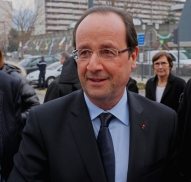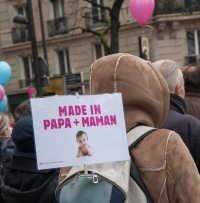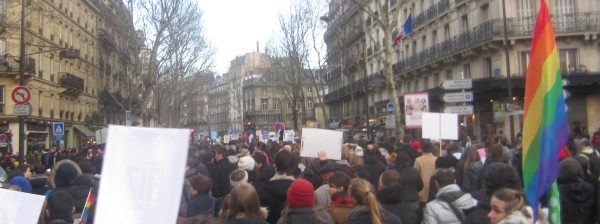France split on new same-sex marriage law
On 23rd April, France became the 14th country to legalise same-sex marriage, with responses in the run-up to this change which fitted the nation’s strike- and protest-loving stereotype. The sentiments behind both the supporting side and the opposition seem to have split the country on this contentious issue, which is believed by some to be the most important social reform in France since the death penalty was banned in 1981.
Revising in my small 6th floor apartment in Paris’ 7th arrondissement, I’m used to a sweeping silence that is occasionally interrupted by car horns and an accordion player in the streets. However, following the Senate’s approval of the bill on 12th April, in the week running up to the final vote on the legislation in the lower house (Assemblée Nationale) the opposition intensified their protests in number, loudness and frequency. Even the passing of the bill has not dampened their spirits as they prepare for their biggest protest yet, a so-called “Mega manif”, on 26th May, French Mother’s Day.
 The proposal of same-sex marriage and LGBT adoption had been under intense discussion and treated as priority legislation since the election of Socialist Party leader Francois Hollande as France’s President in May 2012, for which he announced his personal support during his campaign. In previous years the conservative UMP (Union for a Popular Movement) majority has voted against such measures, and even now the party attempted to challenge the law, and the Constitutional Council recently rejected the challenge as to whether the new law upholds the constitution.
The proposal of same-sex marriage and LGBT adoption had been under intense discussion and treated as priority legislation since the election of Socialist Party leader Francois Hollande as France’s President in May 2012, for which he announced his personal support during his campaign. In previous years the conservative UMP (Union for a Popular Movement) majority has voted against such measures, and even now the party attempted to challenge the law, and the Constitutional Council recently rejected the challenge as to whether the new law upholds the constitution.
According to event organisers, the demonstration in support of the law on 27th January had a turn-out of around 400,000, and taking part in it was somewhat of an Erasmus ‘must-do’. The streets were flooded with colourful flags, witty signs and incessant chanting, yet this was dwarfed by figures from the “Manif pour tous” campaign organisers which have reached as high as 800,000 on 13th January, arguably one of France’s biggest ever public demonstrations, protesting against the law which allows marriage and adoption for same-sex couples. For a country with a secular state and where it was believed that the Catholic Church had lost a lot of influence over the public, with only a small proportion of the approximately 70% Roman Catholic’s being listed as regular church-goers, such huge opposition may come as a surprise. Yet the process and the response in France have largely mirrored that of Spain’s in the run-up to its acceptance of same-sex marriage and adoption laws in 2005, which was a similarly controversial issue in this largely Catholic country.
Another possible explanation for such high numbers is the nation’s discontent with Francois Hollande. He has had some appalling opinion-poll ratings. In March he broke the record by becoming France’s most unpopular president after ten months in office with a rating of 31%. Now it stands at 26%. Some have claimed that the size of the opposition includes generalised anger towards Hollande himself – those who believe he is tampering with the core values of the nation, as well as those who believe that he is making same-sex marriage an unnecessary priority at a time when there are more pressing economic issues, with high unemployment and recent statistics showing that France is back in recession (GDP declined in the first quarter of 2013 by 0.2%). These protests have been the perfect opportunity to voice any discontent. Yet it seems counterproductive to be joining a movement based on the latter type of opposition since it would only prolong the process, discussions and construct of same-sex marriage laws. Perhaps people have come to realise this since the law was passed, and now 67% of the population wants the anti-gay-marriage demonstrations to end, according to a survey by Ifop.
Whatever the motivation, the issue has caught everyone’s attention. The little 6 year old girl who I tutor each week asked me out of the blue “Are you for or against gay marriage?”. When I asked her the same question, she instantly replied “Against”, and proceeded to justify it with “it’s normal for a man and a woman to be together and for everyone to have a mum and a dad”, using a logic which is instilled in our minds from a young age, in her case through children’s books, Disney films and having only ever encountered ‘normal’ families. When I asked what her parent’s views were, she told me that one was for and one was against. Even at the household level, the country has found itself controversially split.
At this point I really did not understand what was going on. I felt as though I was missing a really obvious point that justified the strength, anger and insistence of the opposition, and that I was failing to understand why allowing for equality between opposite-sex and same-sex couples would be such a bad law. After a bit of research, it turns out that this 6 year old had captured the essence of their argument.
The main points of their debate are twofold: marriage as the most important building-block of society, and adoption.
According to opinion polls, same-sex marriage is supported by around 55% of the population, whereas same-sex adoption is opposed by around 53%. Since both marriage and adoption are legalised by this law, opposition has been high by those who believe that the right to gay adoption will remove the fundamental right for a child to have a father and a mother.
At one of the pro-gay-marriage demonstrations, on arriving at Bastille, speeches were given by children with same-sex parents. The main point they were trying to get across was ‘How can you speak for us and say what’s right or wrong for us? We have happily grown up in a loving environment that differs from the norm, but that does not make us scarred, abnormal or different’. Before the new law, there were ways in which both straight and gay individuals could adopt children as single parents; however there is opposition to this right being extended to a gay couple. If children can grow up in an environment with a single parent, adoptive parent(s), grandparents, absent parents, what makes same-sex parents, who are likely to be more loving and caring given the procedure they would have to go through in order to have children, so much less acceptable? It’s the failure to recognise this reality that is making it hard for such children to integrate as anyone else, but because these children have not been given their ‘fundamental right’, somehow this justifies narrow-minded intolerance and discrimination to make their lives harder.
 The opposition have been careful not to become associated with churches or politicians by presenting themselves as a citizens movement (despite being largely made up of Catholics and conservative opposition) and have persistently attempted to avoid homophobic connotations by contesting the framing of the law rather than the ability of same-sex couples to get married and adopt. Their spokeswoman, a comedienne using her stage name Frigide Barjot, has played a core role in driving the media campaign. The cleverly named “La Manif Pour Tous” – demonstration for everyone – suggests that it’s a drive to maintain the existing values that everyone upholds, and they claim that they are not giving up, using promotional videos, press conferences, a snazzy website and even merchandise all of which are continuing to strengthen the movement.
The opposition have been careful not to become associated with churches or politicians by presenting themselves as a citizens movement (despite being largely made up of Catholics and conservative opposition) and have persistently attempted to avoid homophobic connotations by contesting the framing of the law rather than the ability of same-sex couples to get married and adopt. Their spokeswoman, a comedienne using her stage name Frigide Barjot, has played a core role in driving the media campaign. The cleverly named “La Manif Pour Tous” – demonstration for everyone – suggests that it’s a drive to maintain the existing values that everyone upholds, and they claim that they are not giving up, using promotional videos, press conferences, a snazzy website and even merchandise all of which are continuing to strengthen the movement.
The other dispute brought up by the opposition, marriage, has some more depth to it. The separation between secular and religious marriage which exists in countries such as Spain and Portugal, making the law easier to pass even in such Catholic countries, does not exist in France. In Spain, those who oppose gay marriage can comfortably continue to get married in a church, safe in the knowledge that their type of marriage has not been altered by the law. However in France, civil marriage is compulsory, and if the civil code on marriage has any changes made to it, it affects everybody. Any form of religious marriage is illegal without an initial secular marriage, thus the conservatism and religious sentiment has fiercely revived in this debate.
Yet with all of the fervour coming from the opposition, there is no solid backing that the law would result in a dramatic breakdown in society. Civil union already exists in France since 1999 under the name of PACS, a civil solidarity pact between any two adults (same- or opposite-sex) which brings some of, but still less of, the same rights as marriage. The trend in recent years has been a decrease in marriages between opposite-sex couples, with the number of marriages falling each year and nearly 18% less marriages taking place in 2010 compared to 2000, with more and more of them choosing to be ‘PACSed’. If marriage really is such an important building-block of society, then the strength of it has already been weakened over recent years, with or without the new gay-marriage laws.
As I mentioned before, the ‘Manif pour tous’ campaign is clever, and has made a point of emphasising that they are not homophobic and not against the idea of same-sex marriage. Yet when you deny the equal rights of a certain group of people because you believe that it will taint a freedom you already possess, that seems like plain old alienation, intolerance and discrimination, which is an image that the opposition has been too keen to rid itself of. Denying equality because you do not like the idea that a same-sex couple is allowed to call marriage what you also call marriage, even if they do not then choose to have a religious marriage afterwards surely goes against any ‘liberté, égalité and fraternité’ that is upheld by France and its constitution.
As the internet legend and New Zealand MP Maurice Williamson stated, “All we are doing with this bill is allowing two people who love each other to have that love recognised by way of marriage.”
The law has now been passed, and any challenges to it have so far been rejected, but the ‘Manif pour tous’ demonstrations are set to continue. The main result of the campaign seems to really be just the stirring up of more hostility towards the homosexual community across France, with several incidences of death threats, violent attacks on individuals and their property. Support may be waning, we will see the size of the ‘mega-manif’, but now that Hollande has stuck to his word about legalising same-sex marriage, people are ready to move on to more pressing issues. The sooner it ends, the better, and France can peacefully struggle through this time of sluggish growth and high unemployment as the 14th country in the world to legalise same-sex marriage.
[divider]
Header image courtesy of Daria Ibrulj. Image 1 – flickr.com/STUDIOTOBAGO. Image 2 – Daria Ibrulj. Image 3 – flickr.com/Mon_Tours. Image 4 – Daria Ibrulj.



Comments (1)